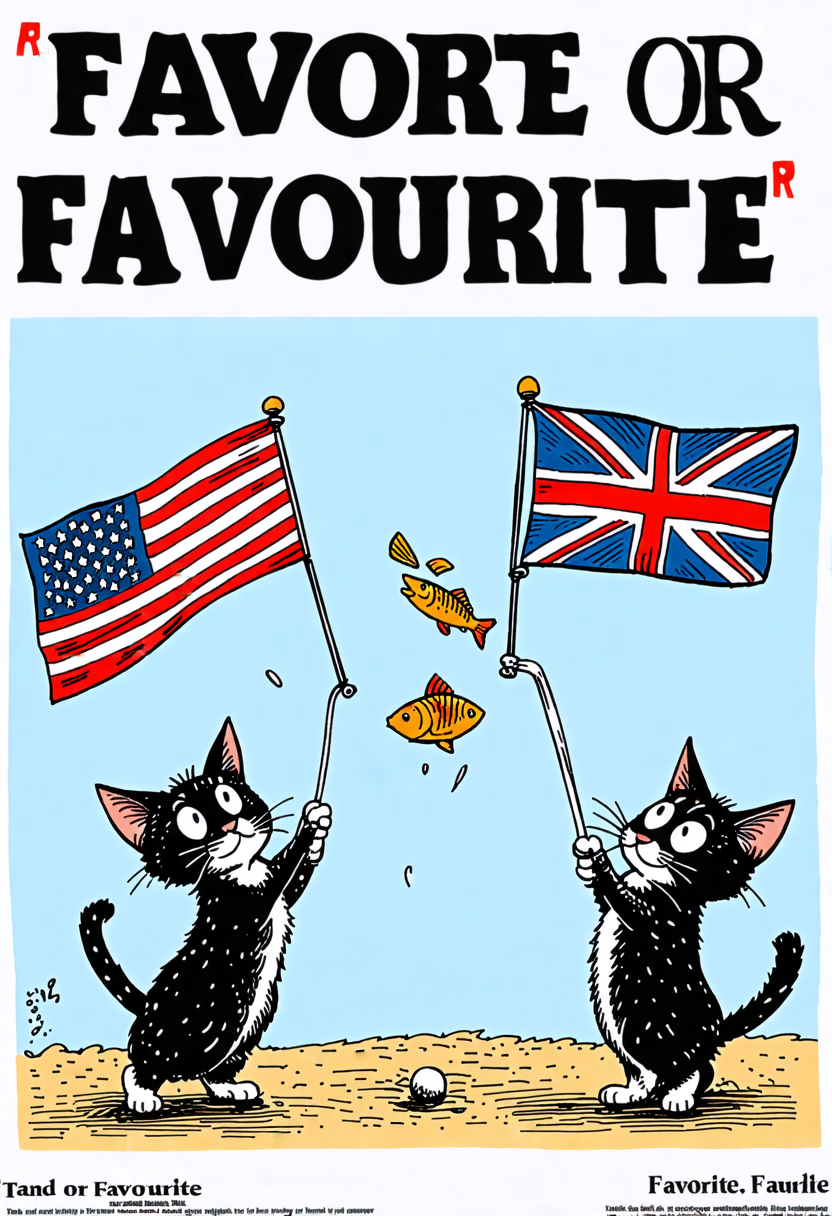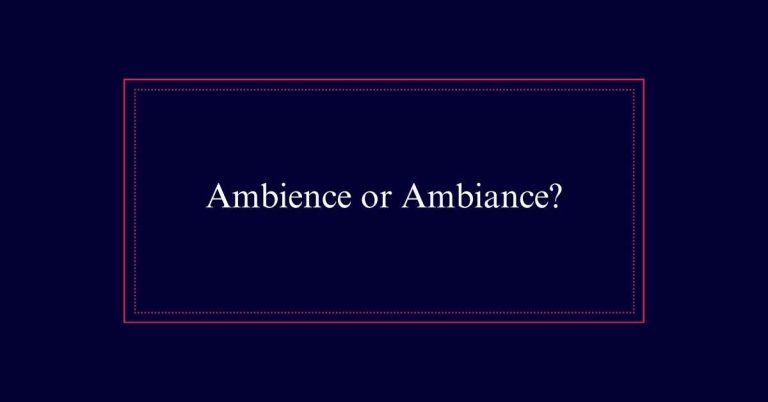Favorite or Favourite?
The difference between ‘favorite’ and ‘favourite’ lies in regional spelling conventions. ‘Favorite’ is used in American English, while ‘favourite’ is used in British English. Both versions mean the same thing—something preferred over others. They are pronounced the same way and have identical meanings as both nouns and adjectives.
American Vs. British Spelling
The difference between American and British spelling often reflects historical efforts to standardize the English language. In American English, influenced by Noah Webster, spellings were simplified. For example, ‘favorite’ drops the ‘u’ found in the British ‘favourite.’ Webster aimed to make spelling more logical and easier to learn.
Conversely, British English, influenced by Samuel Johnson, retains traditional spellings like ‘favourite’ with the ‘-our’ ending. These differences stem from 18th and 19th-century lexicographical choices. Other examples include ‘color’ versus ‘colour’ and ‘honor’ versus ‘honour.
Despite these variations, both spellings are correct within their respective standards and do not affect meaning or usage. This historical divergence highlights the evolution of English spelling conventions.
Pronunciation Similarities
Despite the spelling differences between American and British English, the pronunciation of ‘favorite’ and ‘favourite’ remains identical. This consistency provides a sense of familiarity and unity among English speakers worldwide. Both versions are pronounced as /ˈfeɪ.vər.ɪt/, making them easily recognizable regardless of the spelling.
Here are four reasons to appreciate this linguistic harmony:
- Ease of Communication: Simplifies conversations between American and British English speakers.
- Consistency in Language Learning: Helps non-native speakers learn and use the word confidently.
- Cultural Unity: Bridges the gap between different English-speaking cultures.
- Efficiency in Reading and Writing: Reduces confusion when encountering different spellings in texts.
Meaning and Usage
Understanding the meaning and usage of ‘favorite’ and ‘favourite’ is essential for clear communication in both American and British English. Both words share the same pronunciation and meaning.
As a noun, ‘favorite’ (or ‘favourite’) refers to something or someone preferred over others. For example, ‘Chocolate is my favorite dessert.’
As an adjective, it describes what is most liked or preferred. For instance, ‘Blue is her favorite color.’
The choice between ‘favorite’ and ‘favourite’ depends on the form of English used. Americans use ‘favorite,’ while the British use ‘favourite.’
Noun Usage Examples
In noun form, ‘favorite’ and ‘favourite’ can highlight preferences among items or individuals. These terms are often used to express personal choices or beloved things. Consider the following examples:
Books:
‘Harry Potter is my favorite book series.’
Foods:
‘Pizza is a favourite in our family.’
People:
‘She is the teacher’s favorite student.’
Places:
‘Paris is a favourite destination for many travelers.’

Adjective Usage Examples
As an adjective, ‘favorite’ or ‘favourite’ describes something that is most liked or preferred. For example, one might say, ‘Chocolate is her favorite ice cream flavor,’ in American English. In British English, it would be, ‘Chocolate is her favourite ice cream flavour.’ The meaning remains the same despite the spelling difference.
Using this adjective, you can describe preferences in various contexts. For instance, ‘The blue dress is her favorite,’ or ‘Shakespeare is his favourite playwright.’ Whether in personal choices, like a favorite book, or broader categories, such as a favorite subject in school, the adjective helps to highlight what is most preferred.
Historical Origins
The historical origins of the spelling differences between ‘favorite’ and ‘favourite’ stem from efforts to standardize the English language. These variations emerged during a time when English was evolving rapidly, influenced by various scholars and lexicographers. The divergence can be attributed to different approaches in linguistic standardization by American and British institutions.
Consider these key points to understand the emotional connection to these differences:
- Cultural Identity: Distinct spellings reinforce national identities.
- Historical Legacy: Reflects the impact of influential figures in language development.
- Global Communication: Highlights the adaptability of English in diverse regions.
- Personal Preference: Evokes nostalgia and pride in one’s linguistic heritage.
Samuel Johnson’s Influence
Samuel Johnson’s influence on British English spelling standards has left a lasting legacy. In the 18th century, his dictionary played a critical role in standardizing English spelling.
Johnson preferred the ‘-our’ endings, which are now characteristic of British English. Words like ‘favourite,’ ‘colour,’ and ‘honour’ reflect his choices.
His dictionary became the reference point for British English, establishing norms that are still followed today. Johnson’s work provided consistency in spelling, which was previously lacking.
This standardization helped in formal education and publishing, contributing to a cohesive British linguistic identity. His influence is evident in the continued use of these traditional spellings in the UK and other Commonwealth countries.
Noah Webster’s Impact
Noah Webster’s influence on American English spelling transformed the language’s written form. His push for simplification and standardization led to distinct differences from British English. By advocating for ‘-or’ endings instead of ‘-our,’ Webster aimed to create a more logical and economical spelling system. This change has had lasting impacts on the way Americans write today.
Consider the following benefits:
- Clarity: Simplified spellings are easier to learn and remember.
- Consistency: Uniform spelling patterns reduce confusion.
- Efficiency: Shorter spellings save time and space.
- National Identity: Distinct American spellings foster a sense of cultural identity.
Media Examples
Across various media outlets, the use of ‘favorite’ versus ‘favourite’ often reflects the regional preferences of American and British English. American publications like The New York Times and The Washington Post typically use ‘favorite’. In contrast, British media such as The Guardian and the BBC prefer ‘favourite’. These spelling choices align with the standard practices in their respective regions. Below is a table illustrating examples:
| Media Outlet | Region | Spelling |
|---|---|---|
| The New York Times | United States | Favorite |
| The Guardian | United Kingdom | Favourite |
| Huffington Post | Canada | Favourite |
Spelling Impact on Publications
The choice between ‘favorite’ and ‘favourite’ can influence a publication’s perceived regional identity. Publications often adopt spelling conventions that align with their target audience’s preferences, reflecting cultural and linguistic nuances. For instance, an American magazine will use ‘favorite,’ while a British publication will opt for ‘favourite.’ Such choices can affect reader engagement and trust.
Consider the impact:
- Reader Connection: Aligning with local spelling builds rapport and trust.
- Brand Identity: Consistent spelling reinforces the publication’s regional identity.
- Audience Reach: Correct regional spelling can broaden or narrow the audience.
- Perceived Authenticity: Localized spelling enhances the publication’s credibility.







